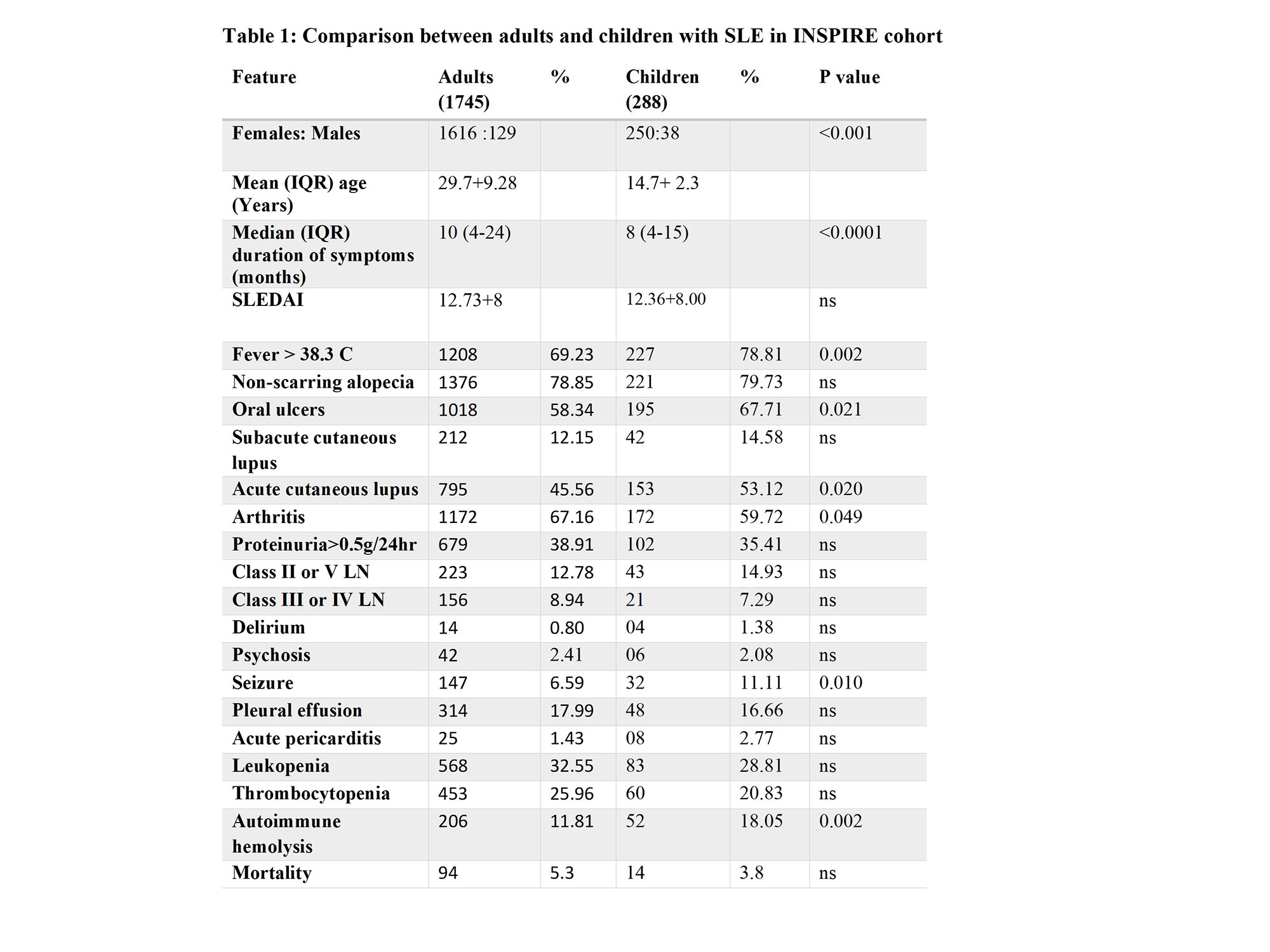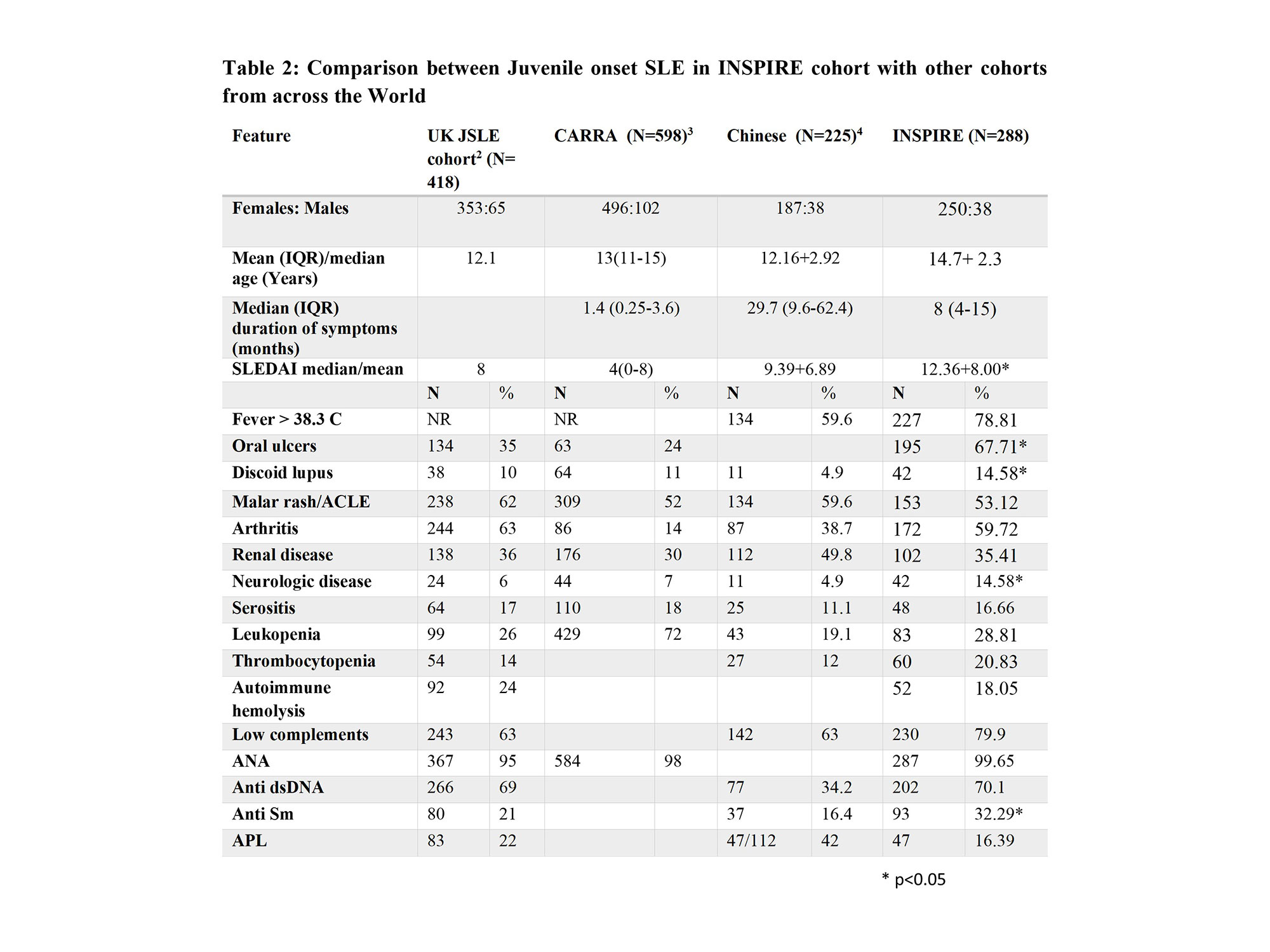Session Information
Date: Sunday, November 13, 2022
Title: Pediatric Rheumatology – Clinical Poster II: Connective Tissue Disease
Session Type: Poster Session C
Session Time: 1:00PM-3:00PM
Background/Purpose: Most Lupus cohorts across the globe have poor representation of patients from South Asia who are ethnically different. We explored the clinical features and autoantibodies in Juvenile onset SLE in India.
Methods: We used the electronic database of Indian SLE inception cohort for research (INSPIRE1), which enrolls all new SLE patients satisfying the SLICC classification criteria seen in the rheumatology unit at 10 tertiary care hospitals. Juvenile onset SLE was defined as onset of symptoms before 18 years of age. Demographic data, clinical features, and autoantibodies were analyzed and compared them with adult onset SLE as well as with other cohorts across the World.
Results: Among a total of 2033 patients there were 288 children (250 girls), The mean age of children was 14.7±2.3 years and the median disease duration was 8 (4-15) months.The three most common manifestations among children were Fever in 227 (78.81%), Non scarring alopecia in 221 (79.73%) and oral ulcers in 195 (67.71%), Nephritis was seen in 102 (35.4%) and major CNS disease in 42 (14.5%).
Children had shorter duration of symptoms prior to diagnosis (8 months vs 10 months) and lower female: male ratio (6.57 vs 12.5). Fever, oral ulcers, acute cutaneous lupus erythematosus (ACLE), seizures and autoimmune hemolytic anemia (AIHA) were observed in significantly higher proportions of pediatric SLE patients as compared to adult patients. On the contrary, arthritis was noted more often in the adult patients (Table1). As compared to cohorts from across the World, Indian patients had higher disease activity, higher prevalence of oral ulcers, discoid lupus, neurologic disease and higher prevalence of anti-Sm antibodies (p< 0.05). (Table 2)
Conclusion: In Indian children with SLE fever and muco-cutaneous manifestation are most common. As compared to adults besides mucocutaneous disease, AIHA and seizures are more common in children. In comparison to data from other cohorts, Indian children had more active disease and neurological manifestations. This variation could be due to genetic differences or due to delay in diagnosis.
1. Shobha V, Aggarwal A, Rajasekhar L, et al Indian SLE Inception cohort for Research (INSPIRE): the design of a multi-institutional cohort. Rheumatol Int. 2021 May;41(5):887-894.
2. Smith EMD, Rasul S, Ciurtin C, et al Limited sensitivity and specificity of the ACR/EULAR-2019 classification criteria for SLE in JSLE?-observations from the UK JSLE Cohort Study. Rheumatology (Oxford). 2021 Nov 3;60(11):5271-5281.
3. Wu CY, Li CF, Wu QJ, etal Chinese Systemic Lupus Erythematosus Treatment and Research Group Registry IX: Clinical Features and Survival of Childhood-Onset Systemic Lupus Erythematosus in China. Chin Med J (Engl). 2017 Jun 5;130(11):1276-1282.
4. Rubinstein TB, Mowrey WB, Ilowite NT, Wahezi DM; Childhood Arthritis and Rheumatology Research Alliance INVESTIGATORS. Delays to Care in Pediatric Lupus Patients: Data From the Childhood Arthritis and Rheumatology Research Alliance Legacy Registry. Arthritis Care Res (Hoboken). 2018 Mar;70(3):420-427.
To cite this abstract in AMA style:
Aggarwal A, Rajasekhar L, Ghosh P, Mathew A, Kavadichanda C, Shobha V, Gupta R, Tripathy S, Rathi M, Jain A, Lawrence A. Juvenile Onset SLE in India-Data from a Multi-institutional Inception (INSPIRE) Cohort of Systemic Lupus Erythematosus [abstract]. Arthritis Rheumatol. 2022; 74 (suppl 9). https://acrabstracts.org/abstract/juvenile-onset-sle-in-india-data-from-a-multi-institutional-inception-inspire-cohort-of-systemic-lupus-erythematosus/. Accessed .« Back to ACR Convergence 2022
ACR Meeting Abstracts - https://acrabstracts.org/abstract/juvenile-onset-sle-in-india-data-from-a-multi-institutional-inception-inspire-cohort-of-systemic-lupus-erythematosus/


